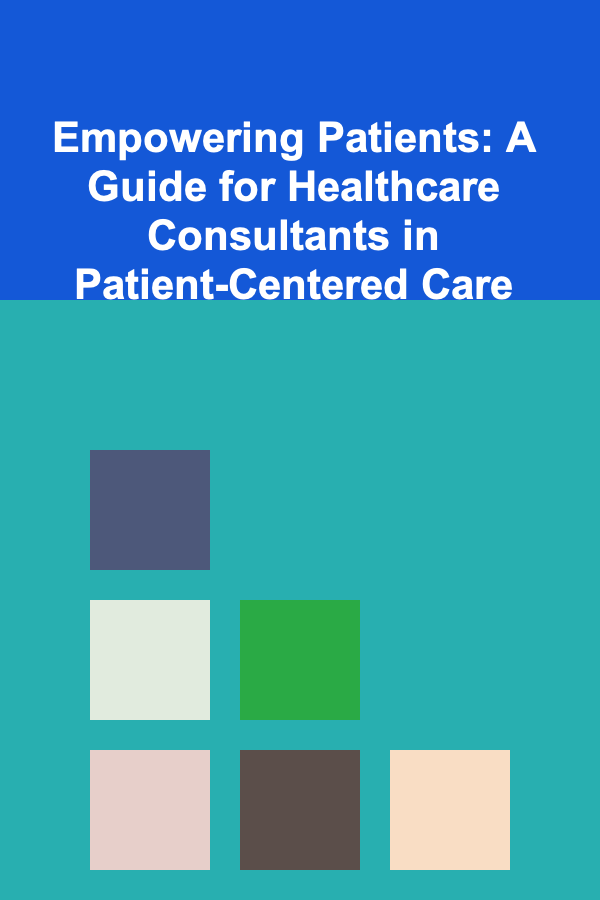
Empowering Patients: A Guide for Healthcare Consultants in Patient-Centered Care
ebook include PDF & Audio bundle (Micro Guide)
$12.99$6.99
Limited Time Offer! Order within the next:

Patient-centered care (PCC) has become the cornerstone of modern healthcare delivery. It emphasizes the importance of understanding the unique needs, preferences, and values of patients while ensuring that they are treated as active participants in their healthcare journey. As healthcare systems face increasing pressures to improve outcomes, reduce costs, and enhance patient satisfaction, healthcare consultants have a critical role in helping organizations adopt and implement patient-centered care models.
This guide will explore actionable strategies and best practices for healthcare consultants working to empower patients and implement a robust patient-centered care framework in healthcare organizations. From understanding the principles of PCC to addressing the challenges that come with its implementation, this article provides practical insights for healthcare professionals looking to transform patient care.
The Core Principles of Patient-Centered Care
Before diving into the specific steps of empowering patients, it's essential to first define what patient-centered care entails. At its core, PCC is about fostering a healthcare environment where the patient's needs are prioritized, and they are actively engaged in decisions regarding their health and treatment. The key principles of PCC include:
- Respect for Patient Preferences and Values: This involves recognizing that each patient is unique, with specific needs and preferences that should be respected throughout their care journey.
- Coordination and Integration of Care: Ensuring that care is coordinated across various healthcare providers and settings, resulting in a seamless patient experience.
- Information Sharing: Providing patients with clear, accurate, and timely information so they can make informed decisions about their care.
- Physical and Emotional Comfort: Addressing both the physical and psychological needs of patients to promote overall well-being.
- Involvement of Family and Friends: In many cases, including the patient's family and loved ones in the decision-making process can enhance the overall experience and contribute to better outcomes.
- Access to Care: Ensuring that patients can easily access the care they need, when they need it, without unnecessary delays.
Strategies for Healthcare Consultants to Empower Patients
1. Foster a Collaborative Patient-Provider Relationship
One of the most effective ways to empower patients is by fostering a collaborative relationship between healthcare providers and patients. This goes beyond simply delivering medical information or instructions; it's about building trust and partnership.
Actionable Steps:
- Promote Shared Decision-Making: Encourage healthcare organizations to adopt shared decision-making (SDM) models, where patients and providers discuss treatment options, weighing benefits and risks to make collaborative decisions. Consultants can train healthcare teams on how to facilitate SDM conversations in a way that is patient-friendly and culturally competent.
- Improve Communication Skills: Consultants should advocate for training healthcare professionals in communication skills, ensuring that they can explain complex medical concepts in simple, understandable language. This helps patients feel more in control and informed about their health decisions.
- Empathy in Practice: Empathy is at the heart of patient-centered care. Consultants should recommend programs and initiatives that focus on improving the emotional intelligence of healthcare providers, ensuring that patients feel heard, valued, and cared for in all interactions.
2. Create Seamless Care Coordination Systems
A fragmented healthcare experience is one of the primary challenges that undermine patient-centered care. Patients often face the frustration of disconnected care across different providers, leading to confusion and suboptimal outcomes.
Actionable Steps:
- Implement Integrated Care Models: Healthcare consultants should work with organizations to implement integrated care systems, such as Patient-Centered Medical Homes (PCMH) or Accountable Care Organizations (ACO). These models emphasize the coordination of care across multiple providers, ensuring that patients receive continuous and holistic treatment.
- Utilize Health Information Technology (HIT): Encourage healthcare organizations to leverage electronic health records (EHRs) and health information exchanges (HIEs) to ensure that all providers have access to a patient's complete medical history. This integration minimizes the chances of miscommunication, duplication of tests, and potential errors.
- Develop Care Pathways: Develop and standardize care pathways that guide patients through their treatment journey, ensuring that they know what to expect and who to contact at each stage. This can reduce anxiety and improve the overall experience.
3. Incorporate Patient Education into Care Plans
One of the most powerful tools in empowering patients is education. When patients are well-informed about their condition, treatment options, and self-management strategies, they are more likely to take an active role in their care and make decisions that benefit their long-term health.
Actionable Steps:
- Personalize Education Materials: Consultants should advise healthcare organizations to create personalized education materials that cater to the patient's literacy level, language preference, and cultural background. This ensures that patients fully understand their care options and the steps they need to take to manage their health.
- Leverage Technology for Education: Healthcare consultants can recommend the use of digital tools, such as mobile apps, patient portals, or online video content, that provide patients with easily accessible, evidence-based information. These platforms can also offer reminders, progress tracking, and educational resources tailored to the patient's journey.
- Teach Self-Management: Encourage healthcare organizations to offer self-management education, especially for chronic conditions like diabetes or hypertension. This may include providing resources on diet, exercise, and medication adherence to empower patients to manage their health outside of the clinical setting.
4. Enhance Access to Care Through Telemedicine and Virtual Health
The increasing demand for healthcare services, combined with long wait times and geographical barriers, makes it essential to explore innovative solutions that can improve access to care. Telemedicine and virtual health services have emerged as powerful tools in making healthcare more accessible and convenient for patients.
Actionable Steps:
- Advocate for Telemedicine Adoption: Healthcare consultants should guide organizations in adopting telehealth solutions, especially for non-urgent consultations, follow-ups, and mental health services. Telemedicine removes geographical barriers, reduces wait times, and increases convenience for patients.
- Support the Integration of Virtual Health Tools: Encourage the integration of remote monitoring devices, mobile health apps, and virtual consultations into the patient care process. These technologies enable continuous monitoring of chronic conditions and provide patients with the tools to take charge of their health.
- Ensure Equity in Access: It's crucial that telemedicine is made accessible to all patients, regardless of their socioeconomic status. Consultants should help healthcare organizations identify barriers to access, such as lack of internet access or digital literacy, and develop strategies to overcome these challenges.
5. Promote Emotional and Psychological Support
Patient-centered care goes beyond physical health; it also focuses on the emotional and psychological well-being of patients. Addressing mental health concerns and providing emotional support can significantly impact a patient's overall health and recovery.
Actionable Steps:
- Incorporate Mental Health Services: Consultants should recommend that healthcare organizations integrate mental health services within their care model. This may include access to psychologists, counselors, or support groups that provide emotional support, particularly for patients dealing with chronic illness or serious diagnoses.
- Train Providers in Psychological First Aid: Equip healthcare providers with the skills needed to recognize signs of emotional distress and provide initial support. This could include training on how to approach difficult conversations, deliver bad news, and provide reassurance and comfort to patients.
- Create Support Networks: Encourage healthcare organizations to create support networks for patients, such as patient advocacy programs or peer support groups. These initiatives provide patients with the emotional backing they need to navigate their healthcare journeys.
6. Measure and Improve Patient Experience
Empowering patients through patient-centered care requires constant assessment and feedback. To ensure that care remains aligned with patient needs and expectations, it is crucial to have robust systems for measuring patient experience.
Actionable Steps:
- Implement Patient Satisfaction Surveys: Regularly collect feedback from patients about their care experience, focusing on aspects like communication, access to services, and overall satisfaction. This data should be analyzed to identify areas for improvement.
- Utilize Patient-Reported Outcomes: In addition to satisfaction surveys, utilize patient-reported outcomes (PROs) to assess the impact of treatment on patients' physical, emotional, and functional health. These insights allow providers to refine care plans based on what matters most to patients.
- Create Continuous Improvement Loops: Use patient feedback as a catalyst for continuous improvement. Consultants can guide healthcare organizations in establishing regular review cycles where feedback is analyzed, and improvements are implemented based on patient needs.
7. Addressing Barriers to Patient-Centered Care
While the benefits of patient-centered care are clear, its implementation is often challenged by various barriers, such as financial constraints, organizational resistance, and limited resources. As healthcare consultants, it is crucial to identify and mitigate these challenges.
Actionable Steps:
- Advocate for Policy Support: Work with healthcare organizations to secure institutional support for PCC initiatives. This may involve advocating for policy changes that prioritize patient-centered care, allocate funding for training, and support organizational shifts towards more collaborative care models.
- Overcome Resistance to Change: Some healthcare providers may resist the shift to patient-centered care due to a lack of understanding or fear of disruption. Consultants can help by clearly communicating the benefits of PCC, providing training, and demonstrating how these changes will improve both patient outcomes and provider satisfaction.
- Ensure Financial Sustainability: Patient-centered care initiatives can be resource-intensive. Consultants should help organizations identify funding opportunities, such as government grants or partnerships with insurance providers, to ensure the long-term sustainability of PCC models.
Conclusion
Empowering patients through patient-centered care is not just a theoretical ideal---it is a practical framework that can significantly improve healthcare outcomes, patient satisfaction, and the overall efficiency of healthcare organizations. Healthcare consultants play a pivotal role in helping organizations transition to and sustain patient-centered care models by providing strategic guidance, implementing best practices, and addressing challenges that may arise.
By fostering collaboration, improving communication, enhancing access to care, integrating mental health support, and continuously measuring patient experience, consultants can help create healthcare systems that truly prioritize the needs, preferences, and values of patients. This transformative approach is the future of healthcare, where patients are not just passive recipients of care but active partners in their health journey.
Reading More From Our Other Websites
- [Metal Stamping Tip 101] Choosing the Right Metal Stamping Die: A Guide for Beginners
- [Home Renovating 101] How to Paint Kitchen Cabinets: A Step-by-Step Guide for a Professional Finish
- [Digital Decluttering Tip 101] The Minimalist's Guide to Cleaning Up Your Inbox and Files
- [Home Party Planning 101] How to Design a Beautiful Party Table Setting at Home
- [Organization Tip 101] Affordable Tile Removal Tools for Budget-Conscious Homeowners
- [Home Family Activity 101] How to Design Engaging Outdoor Family Activities at Home Using Items You Already Own
- [Home Pet Care 101] How to Follow Pet Ear Cleaning Instructions Safely: Avoiding Common Mistakes and Knowing When to See a Vet
- [Beachcombing Tip 101] Nature's Loot: Identifying and Collecting Marine Finds on the Shore
- [Organization Tip 101] How to Make Your Bathroom Feel More Spacious with Organization
- [Organization Tip 101] How to Use Mood Boards for Your Library Design

How to Create a Filing System That Works for You
Read More
How to Inspire Others with Your Successful Rental Organization Strategies
Read More
How to Organize Your Home Security Budget Efficiently
Read More
How to Use Technology to Help with Meal Prep Planning
Read More
How To Pick the Perfect Romance Novel for Your Mood
Read More
Mastering Trading and Economy in MMOs
Read MoreOther Products

How to Create a Filing System That Works for You
Read More
How to Inspire Others with Your Successful Rental Organization Strategies
Read More
How to Organize Your Home Security Budget Efficiently
Read More
How to Use Technology to Help with Meal Prep Planning
Read More
How To Pick the Perfect Romance Novel for Your Mood
Read More